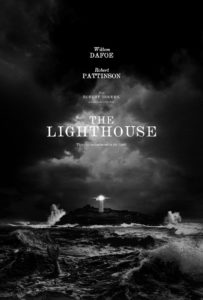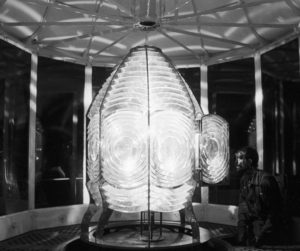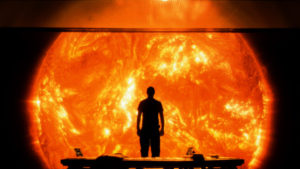“And Moses hid his face, for he was afraid to look upon God.” Exodus 3:6 (NKJV)
 The story of Moses and the burning bush has rattled my being since I was old enough to understand its nuances. An all-consuming fire that did not consume the bush it enveloped. It would seem that this sight by itself would have created a fear in Moses, whether consisting of terror or reverence. Yet the text seems to paint Moses’ reaction to this phenomenon more like the curiosity of a child: “I will now turn aside and see this great sight, why the bush does not burn.” God, however, stops him before he draws near, declares the space to be holy, and makes known to Moses who he is dealing with: “I am the God of your father—the God of Abraham, the God of Isaac, and the God of Jacob.” Once the image and the word become one in the heart and mind of Moses, he hid his face from the overwhelming brightness that saturates the being of God.
The story of Moses and the burning bush has rattled my being since I was old enough to understand its nuances. An all-consuming fire that did not consume the bush it enveloped. It would seem that this sight by itself would have created a fear in Moses, whether consisting of terror or reverence. Yet the text seems to paint Moses’ reaction to this phenomenon more like the curiosity of a child: “I will now turn aside and see this great sight, why the bush does not burn.” God, however, stops him before he draws near, declares the space to be holy, and makes known to Moses who he is dealing with: “I am the God of your father—the God of Abraham, the God of Isaac, and the God of Jacob.” Once the image and the word become one in the heart and mind of Moses, he hid his face from the overwhelming brightness that saturates the being of God.
Moses seemed to intuit the effect of God’s physical presence on the lives of humanity for later on in Exodus 33, Moses encounters God once again and his intuition is proven correct:
“And [Moses] said, ‘Please, show me Your glory.’
Then [God] said, ‘I will make all My goodness pass before you, and I will proclaim the name of the Lord before you. I will be gracious to whom I will be gracious, and I will have compassion on whom I will have compassion.’ But [God] said, ‘You cannot see My face; for no man shall see Me, and live.’” Exodus 33:19-20 (NKJV)
 If we simply take these two encounters with God on their surface, it would seem that there is a metaphysical quality given to the presence of God: an all-consuming fire, light and heat. Yet unlike the bush, it does not seem that our being would withstand God’s radiant face on our own without divine caveat. To take the kingdom by force—to paraphrase Matthew 11—is to stare into a bright abyss.
If we simply take these two encounters with God on their surface, it would seem that there is a metaphysical quality given to the presence of God: an all-consuming fire, light and heat. Yet unlike the bush, it does not seem that our being would withstand God’s radiant face on our own without divine caveat. To take the kingdom by force—to paraphrase Matthew 11—is to stare into a bright abyss.
Sunshine and The Lighthouse find characters seduced by a seeming divine light; they stare into the face of their gods and darkness creeps in through the cracks. These two films show how colonizing the presence of God breeds only darkness, the very antithesis of God.
Sunshine finds a crew of scientists and engineers on a mission, Icarus II, to reignite the sun in order to avoid the extinction of all living beings on Earth. However, their mission is diverted by an emergency signal from a prior failed mission, Icarus I. They are unaware as they board the abandoned ship that one of the crew, Pinbacker (played by Mark Strong), is still alive, but intent on causing the second mission to fail. As he wreaks havoc on the Icarus II, we begin to see that his extensive communion with the sun has taken on a religious zealotry and has deformed him to the point where his very visage is blurred. He calls the sun, God, and states that God revealed to him the futility of man’s designs to save themselves. This belief causes him to kill any who attempted to complete their mission because it was the will of God, or what he called God. Pinbacker’s God is fascinating in that there is an element of it that is true: traditionally the Judeo-Christian faith holds that humanity, on their own, cannot save themselves. The dead cannot raise themselves but can only be raised by an external force outside of them. Yet Pinbacker has twisted this to justify his own killing of the crew and ultimately the death of the human race. This does not at all square itself with the God of the Judeo-Christian faith. Even when God’s wrath was displayed, he always saved a remnant to “carry the fire” to use a McCarthy-ism.
 The Lighthouse, however, plays with the mythologies of the Greek God of the sea and storms, Poseidon, and the titan, Prometheus, who wanted to be a god so bad that he became better than some of them in his shrewdness. He was known as the maker of humans and would trick the gods out of their fire, or essences, and give it to his creations. In this way, Robert Pattinson’s Ephraim is constantly pining after the lighthouse light that Thomas (Willem Dafoe) bathes in on a nightly basis. As the weather stirs up and the two ‘wickies’ are stranded on the island, their sanity goes and Ephraim ends up getting what he wants. The climax happens as the lighthouse light slows to a stop and opens itself to Ephraim as he hits his knees in ecstasy before we are treated to a painterly rendering of a scene that ties in with the story of Prometheus’ death.
The Lighthouse, however, plays with the mythologies of the Greek God of the sea and storms, Poseidon, and the titan, Prometheus, who wanted to be a god so bad that he became better than some of them in his shrewdness. He was known as the maker of humans and would trick the gods out of their fire, or essences, and give it to his creations. In this way, Robert Pattinson’s Ephraim is constantly pining after the lighthouse light that Thomas (Willem Dafoe) bathes in on a nightly basis. As the weather stirs up and the two ‘wickies’ are stranded on the island, their sanity goes and Ephraim ends up getting what he wants. The climax happens as the lighthouse light slows to a stop and opens itself to Ephraim as he hits his knees in ecstasy before we are treated to a painterly rendering of a scene that ties in with the story of Prometheus’ death.
The allegorical elements of The Lighthouse could be taken in multiple ways—and has!—but one element is reminiscent of the Tower of Babel where humanity builds a tower to the heavens, or lights, only to be demolished by God. The story is symbolic of the self-salvation projects that humanity enacts when they aren’t able to complete their own redemption. In a similar way, both Ephraim and Pinbacker have been felled by these bright abysses, their faux gods. Both stories find at their core the distinctness between gods and humanity. Gods are holy for a reason. They create the fire that humanity can only carry. To forget their place is to diminish their beings. In a sense, religion is a means of learning how to stay in our lanes—used in both positive and, unfortunately, negative ways. The beauty of religious affection is in the giving of ourselves to something other, holy.
 In the same way, the meanings of light in both of these films defy the generally positive meanings and readings given to light in most cultural items. Sometimes we forget that while light illuminates and helps us navigate our way in this world, find the truth, and hope for an end to the tyranny of darkness, light has its negative readings as well. Things we never knew existed are revealed to us, the truth it illuminates instigates us, and if we willfully and proudly stare into the light, try to control it, to colonize it, then we run the risk of being ruined by its heat, real and metaphorical.
In the same way, the meanings of light in both of these films defy the generally positive meanings and readings given to light in most cultural items. Sometimes we forget that while light illuminates and helps us navigate our way in this world, find the truth, and hope for an end to the tyranny of darkness, light has its negative readings as well. Things we never knew existed are revealed to us, the truth it illuminates instigates us, and if we willfully and proudly stare into the light, try to control it, to colonize it, then we run the risk of being ruined by its heat, real and metaphorical.
Ephraim and Pinbacker, who were once human, come to find that seeking to become gods will end in death or becoming less than human. Yet, on the other end, neither of the gods revealed in these films had pure light. They were not deserving of the worship and allegiance, they were not the true makers of fire, of light. They promised divinity and yet took away the very image of humanity, the carriers of that light. The other side of these narratives is finding that divinity that can actually do what it promises and can hold the weight of humanity’s being, will, hopes and sins. They must seek the god who uses the light to glorify and not to diminish them. As one of the old confessions said, this, then, is the chief end of man: to find and carry the true light, but not stare into and covet its essence.
